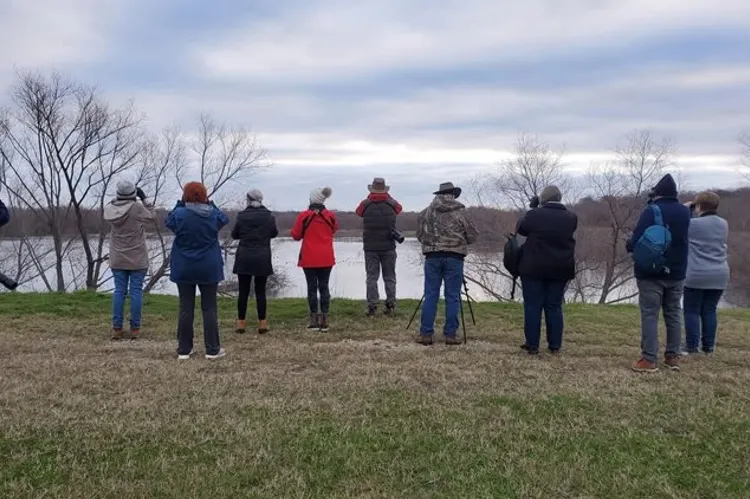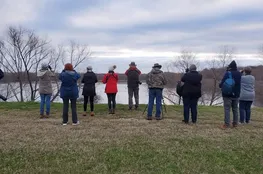ARLINGTON, Texas — Avid birders are trying to convince the City of Fort Worth to reopen a popular birdwatching location in North Arlington that's been closed since officials say an oil pipeline and wastewater line rupture impacted the area in mid-May. The rupture on both a crude oil pipeline operated by Dallas-based Energy Transfer and a wastewater collection line that run perpendicular to each other in west Arlington led to an estimated 2600 bbls of crude oil entering the wastewater collection system and Fort Worth’s Village Creek Water Reclamation Facility in early May. "The oil caused a major disruption to the biological treatment processes at the Village Creek Water Reclamation Facility. Energy Transfer, the pipeline operator, worked with Fort Worth Water staff for to remove the oil so the plant could fully recover. The vast majority of the oil was contained within the plant’s primary treatment area and safely removed by environmental contractors. That material was then transported to one of the oil pipeline company’s facilities for reclamation," Fort Worth Water spokesperson Mary Gugliuzza said. While most of the oil was contained and an EPA-monitored cleanup operation was completed that same month, the City says small amounts of residual oil made it into the treatment system and excess WAS - waste activated sludge - was taken to the Village Creek Drying beds to air-dry before final disposal. Energy Transfer said in a statement to WFAA that the company coordinated "efforts with the Fort Worth Water Reclamation Facility as they repaired a previously damaged wastewater pipeline (unrelated to this incident)." "That damaged wastewater pipeline is what allowed crude to enter their system. There was no impact to public water supplies," Energy Transfer said. Gugliuzza said the WAS will eventually be taken to a landfill for final disposal. "There is probably some small amount of oil in the waste activated sludge (WAS). Once the moisture content is reduced sufficiently, we will test the WAS for all required parameters before it is loaded and trucked to a designated landfill for disposal," Gugliuzza said.
Meanwhile, the Village Creek Drying Beds have been closed to the public since May. Birders say, in addition to its intended purpose in wastewater treatment, the drying beds serve as a waystation for migrating birds and water fowl. More than 300 species have been recorded there. "It’s a jewel in the middle of an urban area," said Colby Ayers, an avid birdwatcher who has visited the drying beds for years. "You feel like you’re in a place of nature, and it’s very peaceful," said birder Elain Jary. "And the nature that is received," added birder Joy Havner, "the therapy that is received from being in that space."
When the sludge connected to the oil spill was taken to a west section of the drying beds, the city of Fort Worth locked the main access gate on NW Green Oaks Boulevard. "The sludge drying beds are an active part of the Village Creek Water Reclamation Facility. We use these sludge drying beds to support the plant’s treatment activity, and we are using the drying beds for their intended purpose. We recognize that the drying beds have long been a point of interest, especially for birdwatders, but we determined that allowing public access to this part of the facility creates significant risk to the City." Gugliuzza said. "But why fence us out," asked Evan Mistur, Ph.D., an assistant professor of Public Affairs at the University of Texas at Arlington. "We’re not a problem. We’re not trying to be a problem. We just want to get in there and look at the birds like some people have been doing for over 40 years." "We want to know a timeline, we want to know when we will be able to get access again," said Maria Panagopoulos. "What can be done to speed up the process so we can maybe have access," added Robert Neill, a retired UTA professor who has led field trips into the Village Creek Drying Beds for more than four decades.
The city of Fort Worth says there are no plans to reopen the drying beds for now, but it will investigate whether it can allow limited temporary access to the area to wildlife groups. "This process will involve the City’s law and risk management staff in making the decision," Gugliuzza said. But Colby Ayers says they have been waiting four months now. "I want to try to educate the city," Ayers said. "I don’t think the city really understands how great of a resource this is for wildlife, birds and a community of people." "
“But why fence us out”
“We’re not a problem. We’re not trying to be a problem. We just want to get in there and look at the birds like some people have been doing for over 40 years.”
“What can be done to speed up the process so we can maybe have access,”
“I want to try to educate the city,”
























